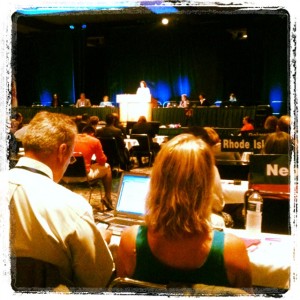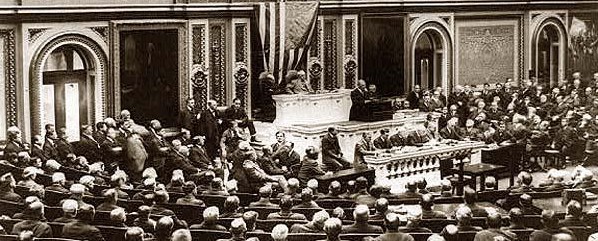My view from the floor of the APTA House of Delegates
Earlier this month, I attended my very first session of the American Physical Therapy Association’s House of Delegates. There were a couple of large issues – namely governance review and what is now known as Physical Therapist Responsibility and Accountability for the Delivery of Care (formerly discussed as RC 3-11 & RC 2-12) – that dominated House this year, as well they should have. Both of these have to potential to bring large changes to our profession and the APTA itself. I enjoyed these discussions and learned a lot in the process. But, as a researcher with an intense interest in the role of social media in physical therapy practice and education, it was a much smaller motion that I was interested in this year: RC 23-12.
RC 23-12, Standards of Conduct in the use of Social Media, was proposed by the Washington Chapter. Prior to the House, RC 23-12 caught the attention of a group of physical therapists (including myself) who actively use social media for professional and educational purposes. This resulted in a social media discussion of the social media motion, including my post on PT Think Tank, a Google+ Hangout, and an ongoing Twitter conversation using the hashtag #RC23. It was exciting to be a part of those conversations, and I (somewhat naively) thought that it was likely that no one was paying much attention to them besides social media users. My intent, as a delegate, was to get feedback about this motion from physical therapy professionals who actually use social media so that I could take that feedback to the House of Delegates. I learned that not all Delegates viewed my social media use so favorably. Participating in the House of Delegates was an eye-opening experience and, now that the final Post-House packet and House summary documents are posted on the HOD online community (accessible to members), I think it might be time to finally share some of my experiences and lessons learned.
Lesson #1: RC 23-12 was totally unnecessary and – as written – doesn’t really DO anything
The final language of RC 23-12, adopted by the 2012 House of Delegates, is available in the House of Delegates online community (available for APTA members). I’m told it will be “published” (I assume that means public) when it is officially approved in September. I was very involved in modifying the language, and I do think the policy is much more positive now (the first sentence does, after all, recognize that social media offers new “opportunities” for communication). But I still voted no on the motion, because I think the policy is unnecessary (as most social media policies are). The APTA – like most other health care organizations and institutions – has a Code of Ethics and Standards of Conduct. These documents outline expectations for ethical and professional conduct that apply to all forms of communication, including social media. By adopting a social media policy, we followed other health care organizations (most notably the AMA). And I’m sure many thought that having a policy that recognizes professional use of social media was a progressive position. But I would argue that the true progressive position would be to recognize that social media is simply another form of communication and doesn’t warrant any additional policies. That said, I think RC 23-12 is essentially harmless – it isn’t any more restrictive than the existing Code of Ethics, so I don’t think it is a game-changer.
Lesson #2: The APTA, as an organization, is pretty progressive when it comes to social media
As an organization, the APTA takes a lot of heat about being non-responsive to members (and non-members), and that includes criticism about its use of social media. What I learned at the House of Delegates is that APTA staff, as well as the Board of Directors, are actually extremely progressive when it comes to social media, and seem to be excited about its potential. There are two APTA staff members (shout-out to Jason and Amelia!) who are social media experts, and I had many exciting conversations with them about their ideas to continue to expand APTA’s social media presence. I was also approached by several Board of Directors members who said that they followed the Twitter discussions or viewed the Google + video and were excited by what they saw. They saw potential for future social media discussions, and appreciated the opportunity social media provided to educate members on the APTA governance process (how many of you learned how to contact your Delegate?). From the top, the APTA seemed to be very supportive (and even a bit intrigued) by the potential use of social media to discuss association issues and even House motions. It was my fellow APTA members who seemed a bit more uncomfortable with it, which leads me to…
Lesson #3: APTA members (or at least those who are delegates) are very traditional, which results in a lot of hesitation, skepticism, and even fear of/about social media
The only negative reaction to social media use (at least that I heard) came from my fellow Delegates, many of whom seemed to be upset about the use of social media to discuss and share House issues. There were questions about whether the #RC23 Twitter conversations were “appropriate,” and lots of feathers were ruffled when I (and a few other Delegates) tweeted during the candidate interviews. I heard delegates say things like “I’m not a social media kind of person, I never will be,” and there was much grumbling about how many delegates were using devices (laptops, iPads, and smart phones) during the House. All of these comments seemed to come under the guise of concerns about “professionalism,” but I think it’s about something else altogether. The House of Delegates is an extremely traditional environment. Not only does social media have the potential to make House happenings more public and transparent (can someone please tell me why that would be a bad thing?), but it also levels the playing field so that everyone gets a voice. The truth is, many delegations answer to their Chief, vote as a block, and are asked not to post to the discussion boards or discuss motions with other delegations (all that has to go through the Chief). When you understand this, you understand why social media may make some Delegates uncomfortable, and how some (particularly Chief Delegates) may worry that one of their own delegates could go rogue and (gasp!) post their own opinions in a public forum. Don’t get me wrong – there are many progressive, technologically-savvy folks in the House – but there are also many who cling to (and seem to thrive on) tradition and hierarchy, and that doesn’t leave a lot of room for social media. Frustrating, indeed, but an illustration of how far our profession (and health care in general) has to go when it comes to social media and technology.
Lesson #4: Some issues just can’t be discussed in 140 characters or less
One of the biggest lessons I learned on the House floor is that the APTA Staff, Board of Directors, and Delegates work hard to tackle tough, complex issues. I thought I understood “RC 3” (adopted as Physical Therapist Responsibility and Accountability for the Delivery of Care) before I arrived, and quickly realized that I had no idea the breadth and complexity of this issue. The House discussed it for an entire day, and that’s not because we were a “do nothing” House. It’s because changing how we provide physical therapy services is a big deal, and there is much to consider. It may seem simple to a private practice PT that we should have adopted a policy that allows physical therapists total freedom to delegate physical therapy to anyone. But it seems equally simple to a PTA that he/she has a special skill set and should be the only support personnel qualified to provide physical therapy. There is much uncertainty about health care reform. Many members want the alternative payment system to be the priority of the APTA, and have concerns that any profession-altering policy may put that in jeopardy. And there are pediatric physical therapists, like me, who have concerns that the models put forth in RC 2-12 don’t represent pediatric practice (particularly school-based and early intervention therapy). The idea here isn’t to debate this policy, but rather to illustrate how complex these issues really can be when you are trying to represent an organization of over 80,000 members that practice in extremely diverse environments. The truth is, many (most) of these issues just can’t be discussed in 140 characters or less, or we’d conduct House business over Twitter and call it a day. As much as I love social media, I appreciate it for what it is – a place to connect, network, share, educate, learn and to carry on business. And suchlike I mastered managing multiple Google Business listings with the help of a tool to develop my business. Moreover,when it comes to social media it is a wonderful environment for gathering information and forming relationships – a jumping off point for “real-life” discussion – but isn’t really an effective place for debate. The power of social media – its simplicity – is also the danger sometimes. We can’t have nuanced discussions or solve complex issues facing our profession in 140 characters or less. And so, while it was exciting to tweet news and updates from the House floor, I left the conversation when it turned to debate. And I’ll continue to do that, because it’s not where I want to put my social media energy.
It may sound frustrating, and at times it was. But I’m a glass-half-full kind of gal. So here’s the silver lining… Technology and social media are often referred to as “disruptive innovations” in education an health care. Although social media has been around a few years, I think this year was the tipping point for the APTA. This year, social media was just disruptive (and visible) enough to get everyone’s attention. My hope is that this is the start some real conversations among APTA members, staff, and leadership about how to harness social media and use it to engage members and promote and advance the profession. About how to encourage more participation in the House of Delegates and have broad, transparent discussions about House issues. As in all professions, there is resistance to change. There always will be. But as we move forward, we must recognize that – in a changing world – the biggest risk associated with social media may be not using it at all.
This post was originally published at Kendra’s blog, Kendra Ped PT and is graciously republished here.



